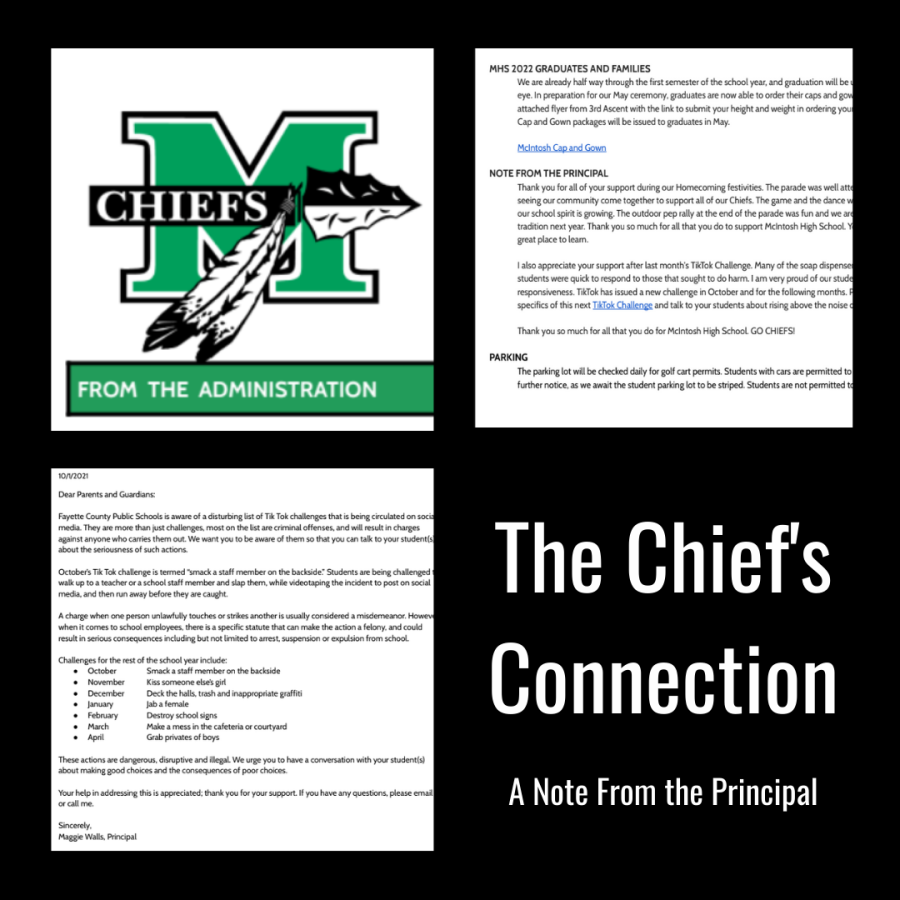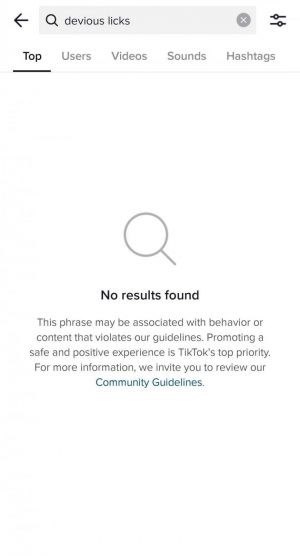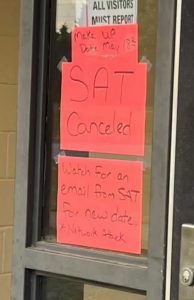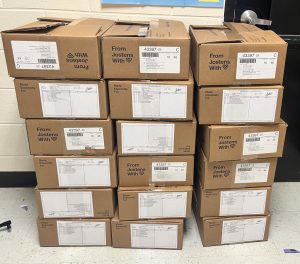Note From the Principal
Lulu Vitulo
Graphic with the Chief’s Connection from the week of Oct. 4 and a note from the principal, designed by Lulu Vitulo
Oct 27, 2021
The Chief’s Connection from the week of Oct. 10 contains a note from the McIntosh Principal, Margaret Walls, on the subject of harmful Tik Tok trends. The note begins with Walls thanking the McIntosh “community” for helping with and attending the Homecoming Dance and Parade on Oct. 2. Walls said, “The parade was well attended and we enjoyed seeing our community come together to support all of our Chiefs. The game and the dance were well attended and our school spirit is growing.”
Walls goes on to also thank McIntosh for the handling of the TikTok trend of last month. The trend was performing a “devious lick,” which is attempting to steal an item from one’s school. The trend grew until even soap dispensers were being stolen, and Mrs. Walls went on the morning announcements to warn students of the consequences that “devious licks” would entail.
By the end of the month, students began doing the opposite, i.e doing an “angelic yield,” or returning/replacing stolen items. “Many of the soap dispensers were returned and our students were quick to respond to those that sought to do harm. I am very proud of our students and their responsiveness,” said Walls.
However, Walls says that “TikTok has issued a new challenge in October and for the following months,” and links a PDF with the supposed predicted trends for the months of October, November, December, and all the way to April. She tells students to “[rise] above the noise of social media.”
The PDF contains more from the Principal. It reads: “Fayette County Public Schools is aware of a disturbing list of Tik Tok challenges that is being circulated on social media. They are more than just challenges, most on the list are criminal offenses, and will result in charges against anyone who carries them out. We want you to be aware of them so that you can talk to your student(s) about the seriousness of such actions.”
The challenge for Oct. is “smack a staff member on the backside,” which the letter warns “when it comes to school employees, there is a specific statute that can make the action a felony, and could result in serious consequences including but not limited to arrest, suspension or expulsion from school.”
“[F]or the month of Oct., it’s supposed to be slap, teacher or administrator, or whoever. Basically they will have assault charges, simple assault charges pressed against and if they do that. Last month was, the vandalism, a lot of restaurants and stuff like that. They will get a criminal trespass. They’ll be arrested with criminal trespass and if they were to do over $500 worth of damage, it would be criminal damage,” said Officer Brandon Weathersby when asked what charges students could be pressed with if they participated in such challenges.
He also said, “Do not do it, unless you want to be arrested and go to jail or go to YDC [Youth Development Center], it is not a good idea to do. Growing up, I was arrested as a kid, at 14 years old for vandalizing my teachers car, and it was not a good choice that I did and I regret it to this day and you don’t want to do stuff like that it’s, it’s gonna lead you on deep and deeper and trouble, and possibly expelled from the school,” in response to what he would say to students who are thinking of participating in the challenges.
The other listed challenges are as such: November, “kiss someone else’s girl”; December, “Deck the halls, trash and inappropriate graffiti”; January, “jab a female”; February, “Destroy school signs”; March, “Make a mess in the cafeteria or courtyard”; and lastly, April, “Grab privates of boys.” All of these challenges can have serious school, or legal, consequences. November, January, and April have trends that can be filed as sexual harassment/assault, while December and March encourage school vandalism.
Mrs. Walls says, “These actions are dangerous, disruptive and illegal. We urge you to have a conversation with your student(s) about making good choices and the consequences of poor choices.”











